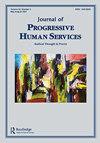无家可归者服务的政治经济模型
IF 0.8
Q1 SOCIAL WORK
引用次数: 0
摘要
尽管在过去的10年里,美国一直试图结束无家可归现象,但无家可归现象只减少了10%左右。本文介绍了一个理论模型,解释为什么有些人获得了住房和其他类型的服务,而另一些人却没有。该模型结合了政治经济学理论和街头官僚主义理论来解释无家可归者的服务差距。利用这个模型,本文解释了影响无家可归者服务机构的主要政策。它还使用当前的研究来解释从业者如何管理这些约束。讨论了对社会服务从业者的建议。本文章由计算机程序翻译,如有差异,请以英文原文为准。
A Political Economic Model of Homeless Services
ABSTRACT Despite attempts to end homelessness in the United States occurring over the past 10 years, homelessness has only been reduced by about 10%. This article introduces a theoretical model for why some individuals have gained housing and other types of services while others have not. This model incorporates both the political economy theory and the street-level bureaucracy theory to explain service gaps for homeless individuals. Using this model, this article explains major policies affecting agencies which serve the homeless. It also uses current research to explain how practitioners manage these constraints. Recommendations for social service practitioners are discussed.
求助全文
通过发布文献求助,成功后即可免费获取论文全文。
去求助
来源期刊

Journal of Progressive Human Services
SOCIAL WORK-
CiteScore
3.20
自引率
8.30%
发文量
14
期刊介绍:
The only journal of its kind in the United States, the Journal of Progressive Human Services covers political, social, personal, and professional problems in human services from a progressive perspective. The journal stimulates debate about major social issues and contributes to the development of the analytical tools needed for building a caring society based on equality and justice. The journal"s contributors examine oppressed and vulnerable groups, struggles by workers and clients on the job and in the community, dilemmas of practice in conservative contexts, and strategies for ending racism, sexism, ageism, heterosexism, and discrimination of persons who are disabled and psychologically distressed.
 求助内容:
求助内容: 应助结果提醒方式:
应助结果提醒方式:


